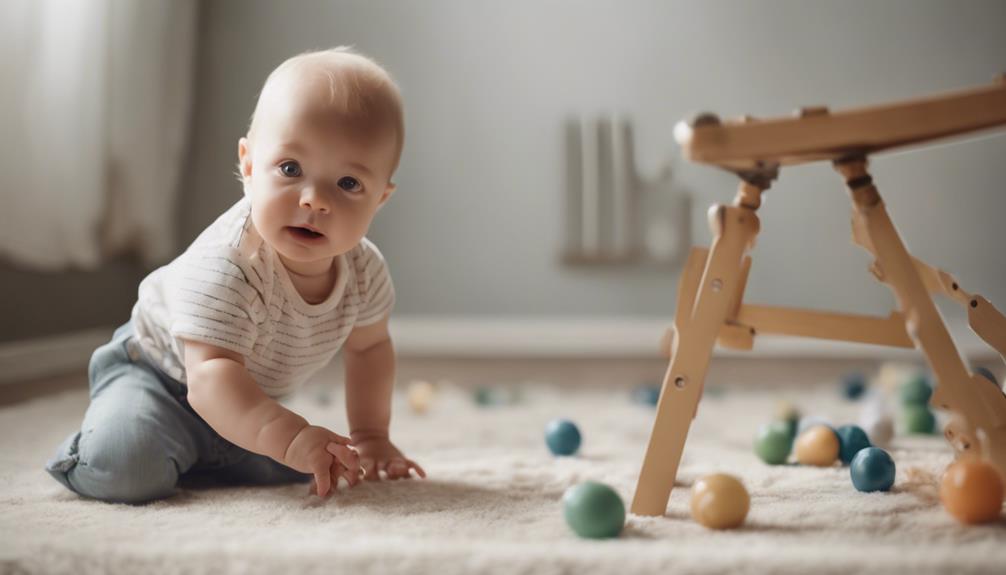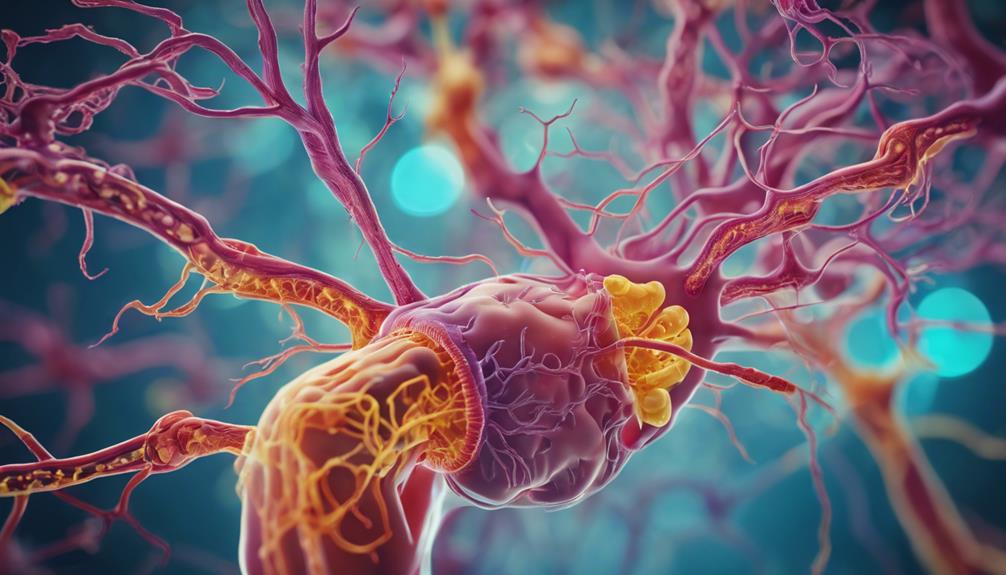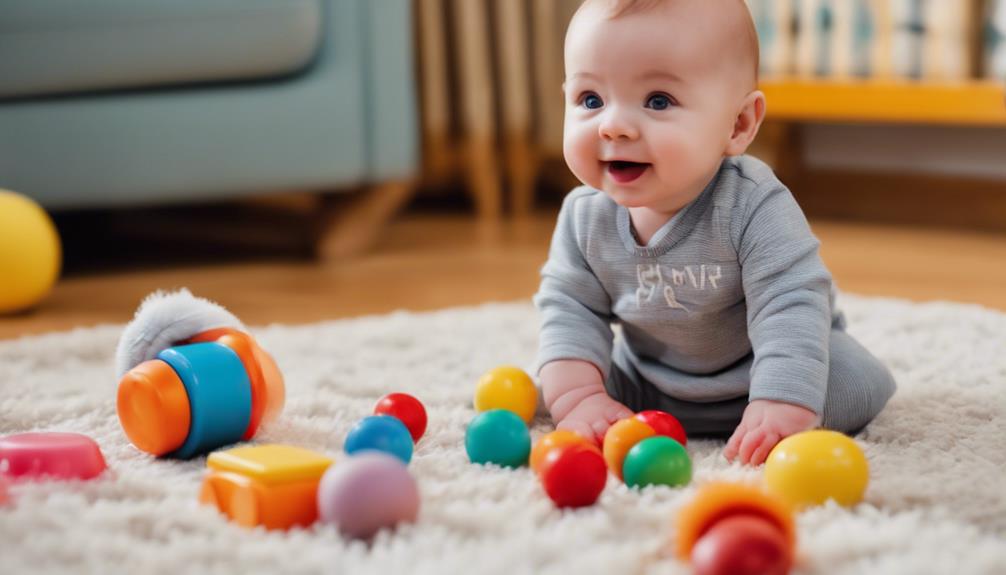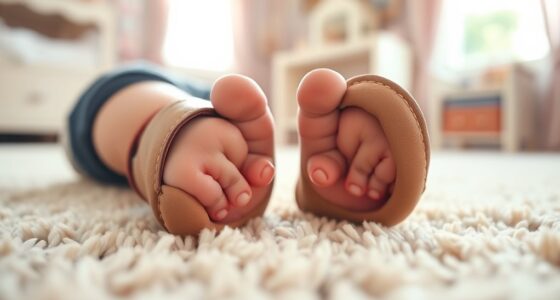Discover the major milestones in your baby’s first year to monitor their physical, cognitive, and emotional growth. Around 5-6 months, babies typically double their weight, while mastering skills such as rolling over, sitting up, and grabbing objects, which demonstrate their motor skills. Social smiles and laughter usually emerge around 4 months, fostering emotional bonds. By 6 months, babies begin babbling, followed by uttering simple words by 9-10 months, enhancing their communication abilities. Transitioning from a liquid-only diet to solid foods usually occurs around the 6-month mark. Sufficient sleep plays a crucial role in cognitive development, with most babies sleeping through the night by 4-6 months. Recognizing these milestones is essential for fostering your baby’s growth for a healthy start in life.
Key Takeaways
- Babies double birth weight by 5-6 months, triple by 1 year.
- Rolling over, sitting up, crawling, standing, walking signify rapid physical development.
- Language development progresses from babbling to first words.
- Social interactions begin with smiling at caregivers around 2 months.
- Introduction of solid foods typically starts around 6 months.
Physical Development Milestones
In a baby's first year, significant physical development milestones are reached, showcasing rapid growth and motor skill advancements. Babies typically double their birth weight by 5-6 months and triple it by their first birthday, indicating substantial physical growth.
Milestones like rolling over, sitting up, standing, and eventually walking demonstrate the swift physical development that occurs in the initial year. Developmental milestones track motor skills, such as supporting their weight on legs when held upright, as an essential aspect of physical growth.
Gross motor skills like crawling and walking, along with fine motor skills such as grasping objects, are key indicators of a baby's physical development progress. Additionally, babies explore objects with their mouths, aiding oral sensory development and strengthening muscles essential for achieving physical milestones.
Regular well-baby visits help monitor physical development, ensuring babies are reaching these important milestones at appropriate times.
Cognitive Development Milestones
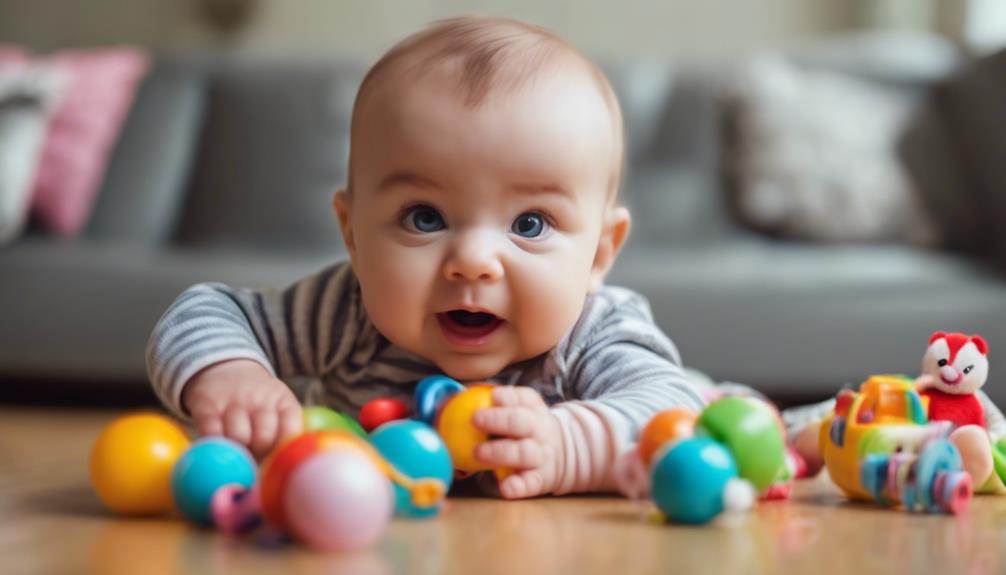
As your baby grows, you'll notice early sensory exploration, like touching and grasping objects to understand their textures.
Language development progresses with babbling turning into more intentional sounds and eventually first words around 12 months.
Keep an eye out for problem-solving skills emerging, such as figuring out how to reach a favorite toy or stack blocks.
Early Sensory Exploration
Engage your baby in early sensory exploration to foster cognitive development and enhance their understanding of the world around them. By encouraging sensory play, you can help your baby develop essential cognitive skills.
Consider the following sensory activities:
- Introduce rattles with different textures to stimulate your baby's sense of touch.
- Use soft toys that make different sounds to engage your baby's hearing.
- Offer textured objects for your baby to explore with their hands and mouth.
Through sensory exploration, babies can reach cognitive milestones such as recognizing familiar faces, responding to sounds, and tracking moving objects. These activities lay the groundwork for future cognitive abilities like problem-solving and memory.
As your baby grows, continue to provide opportunities for sensory play to support their cognitive development and overall learning experience.
Language Development Progress
Encourage your baby's cognitive development by actively engaging in language development progress, a key milestone in their first year of growth. Babies learn to babble around 6 months, exploring different sounds and syllables as they start to communicate. By 12 months, most infants can utter simple words like 'mama' or 'dada,' showcasing their early language skills.
During the first year, language development involves infants understanding and responding to basic commands, showing progress in cognitive growth. As babies recognize familiar words and sounds, their language abilities improve rapidly, laying the groundwork for future communication.
Interacting with your baby through talking, reading, and singing can significantly enhance their language development milestones. By fostering a language-rich environment, you're supporting your baby's cognitive advancement and setting the stage for continued learning and communication skills to flourish.
Problem-Solving Skills Emergence
Developing problem-solving skills emerges in babies around 8-12 months of age as they begin to understand cause and effect relationships. During this stage of cognitive development milestones, infants show curiosity and problem-solving abilities by exploring objects in various ways. They start to grasp the concept of trial and error, utilizing spatial awareness and memory retention to achieve desired outcomes.
To enhance your baby's problem-solving skills, engaging in specific activities can be beneficial. Consider incorporating the following into your routine:
- Shape sorters: These toys challenge your baby to match shapes with corresponding holes, promoting problem-solving abilities.
- Nesting cups: By stacking and nesting cups of different sizes, your baby learns about spatial relationships and cause and effect.
- Simple puzzles: Introducing basic puzzles helps develop your baby's cognitive skills by requiring them to problem-solve to complete the picture.
Encouraging these problem-solving activities can play a crucial role in your baby's cognitive development journey.
Social and Emotional Development Milestones

During your baby's first year, they'll reach significant milestones in social and emotional development. Around 2 months, babies start smiling in response to caregivers, indicating the beginning of their social interactions. Genuine smiles, showing an understanding of social cues, typically appear around this time.
As they reach 4 months, laughter emerges, triggered by simple actions like tickling, reflecting joy and emotional responses. These expressions of happiness through smiling and laughter play an essential role in infants' social interactions and emotional development.
Social games such as peek-a-boo further aid babies in exploring emotions and developing essential social skills during their first year. Encouraging and responding to your baby's smiles, laughter, and social cues can foster a strong foundation for their emotional well-being and social interactions as they continue to grow.
Communication Milestones

Around 6 months of age, babies typically begin babbling, laying the groundwork for their language development. As your little one grows, their communication milestones become more pronounced. By 9-10 months, you may hear simple words like 'mama' or 'dada,' showcasing their progress in language skills.
Additionally, gestures such as pointing, waving, and clapping usually emerge around 10-12 months, enhancing their non-verbal communication abilities.
Understanding simple instructions or commands, like 'wave bye-bye,' can be seen in babies around 11-12 months.
Engaging in 'conversations' by taking turns making sounds or babbling with caregivers is a significant milestone in communication development.
Encourage your baby's language skills by responding to their babbles and gestures, creating a nurturing environment for their communication growth.
Feeding Milestones

When it comes to feeding milestones in your baby's first year, you'll navigate choices between breastfeeding and formula, introducing solid foods, and establishing a feeding schedule.
These key points are vital for ensuring your little one's nutrition and growth. Understanding these milestones will help you support your baby's development during this critical stage.
Breastfeeding Vs. Formula
For your baby's first year growth milestones, understanding the differences between breastfeeding and formula feeding is essential for their health and development. Both methods have their advantages and can support your baby's growth effectively.
Breastfeeding:
- Provides essential nutrients and antibodies important for your baby's growth and development.
- Promotes bonding between you and your baby while reducing the risk of infections.
Formula feeding:
- Guarantees proper nutrition for babies who can't breastfeed.
- Offers flexibility for caregivers and ensures that your baby receives adequate feeding.
It's important to choose the feeding method that works best for you and your baby's needs. Whether you opt for breastfeeding or formula feeding, both can contribute to supporting healthy growth and development in your little one during their first year.
Introducing Solid Foods
Introducing solid foods to your baby typically begins at around 6 months of age when they start showing signs of readiness such as sitting up and showing interest in food.
The American Academy of Pediatrics suggests starting with single-ingredient purees and gradually introducing various textures and flavors to your baby.
It's essential to offer a wide variety of fruits, vegetables, grains, proteins, and dairy products to guarantee a balanced diet for your little one during their first year.
Keep an eye out for any signs of food allergies or intolerances, like rashes, vomiting, or diarrhea, when introducing new foods to your baby's diet.
If you have any concerns or need guidance on introducing solid foods and meeting your baby's nutritional needs, consulting with a pediatrician or a registered dietitian is recommended.
Feeding Schedule Basics
Establishing a consistent feeding schedule is essential for your baby's growth and development during their first year. When it comes to feeding milestones, here are some key points to keep in mind:
- First 4-6 Months: Babies typically start on a liquid-only diet of breastmilk or formula during this period.
- Around 6 Months: Introducing solid foods usually begins as babies show signs of readiness.
- 8-10 Months: Babies can reach for and feed themselves finger foods, indicating the shift to a more varied diet.
As your baby grows, their feeding schedule will evolve. The American Academy of Pediatrics recommends exclusive breastfeeding for about 6 months before incorporating solids. By 12 months, most babies can enjoy a wide range of foods and even start joining family meals with adjustments for texture and safety.
Stay attuned to your baby's cues and consult with your pediatrician for guidance on their feeding journey.
Sleeping Milestones

Deciphering the mystery of your baby's sleep patterns is an essential part of understanding their growth milestones in the first year. As your baby develops, achieving healthy sleep patterns becomes important for their overall development.
By around 4-6 months, most babies can sleep through the night, which is a significant milestone for both you and your little one. Getting a full night's sleep isn't only important for your baby's physical health but also plays an essential role in their cognitive development.
Your baby's health care provider can offer guidance on how to establish good sleep habits to make sure your baby thrives and reaches certain milestones. Healthy sleep patterns are essential for your baby's well-being and growth in their first year.
As your baby grows and develops better sleep habits, you can expect relief from those sleepless nights, knowing that adequate sleep is helping your baby reach their developmental milestones.
Motor Skills Milestones
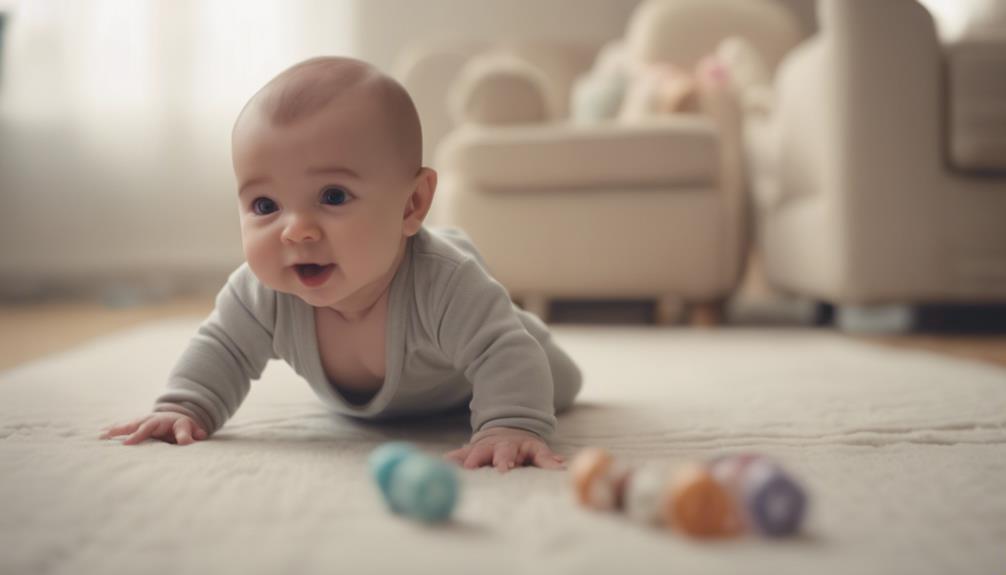
Developing motor skills in your baby during their first year is an exciting journey marked by significant milestones that showcase their physical growth and coordination.
Around 4-6 months, your baby may start rolling over, demonstrating improved muscle control and coordination.
By 6-8 months, most babies can sit up without support, showing enhanced balance and core strength.
Crawling typically begins around 8-10 months, indicating further development of motor skills and spatial awareness.
As your baby reaches 9-11 months, you may notice them standing with assistance, which highlights progress in leg strength and coordination.
Finally, between 12-15 months, walking independently usually begins, marking a significant milestone in gross motor skill development.
Encouraging and supporting your baby through these stages will help them build confidence and independence as they continue to explore and interact with the world around them.
Frequently Asked Questions
What Are the Milestones for a Baby's First Year?
In your baby's first year, milestones like smiling at 2-4 months, sleeping through the night by 4-6 months, sitting up by 5-6 months, crawling at 8-9 months, and rapid weight gain mark their incredible growth journey.
What Are Developmental Milestones in the First Year of Life?
In the first year of life, babies achieve milestones like smiling, laughing, sitting up, crawling, and sleeping through the night. These indicate healthy development. Smiling begins around 2 months, with laughing at 4 months.
What Are 1 Year Developmental Milestones Checklist?
You're curious about 1 year developmental milestones checklist. Walking, talking, exploring – your little one is on the move! Independence shines through, words start flowing, and their world becomes a playground of growth and discovery.
What Are the Major Normal Developmental Milestones Attained by a 1 Year Old Child?
You're witnessing major milestones in your 1-year-old: standing, taking first steps, saying simple words, and understanding commands. They're curious, exploring, and showing preferences. Social interactions grow, with games like peek-a-boo becoming favorites. Enjoy this exciting stage!
Conclusion
Have you been tracking your baby's growth milestones in their first year?
From physical development to cognitive, social, and emotional milestones, each step is vital in their development.
Remember to celebrate each achievement, no matter how small, as your little one grows and learns.
Keep providing a nurturing environment, plenty of love, and support as they continue to reach new milestones in the exciting journey of their first year.


